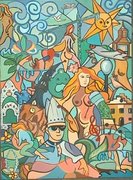She was 40 plus, plump with a stern face, distrustful, mostly silent at the beginning. she would soon be our third flatmate. Her story is a strange one. She had just gotten married, she told us, to an Egyptian, living illegally in holland. She had met him one afternoon through her brother. she saw him, they spoke for a little while and then that very same evening, she said yes to his proposal. Far from a love at first sight story. At her age, she told us, who really seeks love? so they got married, a regular civil wedding. That night, she lost her virginity, amidst fear, pain and violence, she said. she went into details which were surprising- how she couldn´t relax, how he penetrated her every night, how it was even painful to pee, how someone had told her it would have been easier and less painful if they had done it on the floor.. she lamented, it seemed, not knowing these details beforehand. she had said that her mother insisted she get a "certificate of virginity" to show to her husband before marriage. she told me how it was common practice where she came from, and that some men even requested it, after all, women were not to be trusted nowadays. After her "honeymoon" week was over, she had to resume her life in Spain, leaving her husband behind and promising to apply for his residence as soon as she got a house contract. but this was all months ago. she had seen him a couple of times in between, travelling to holland on weekends or during "puentes" to be with him.
So how much did she know of her husband? not much, it seemed. she had no idea if he had been married before, if he had children, how much money he earned etc.. she would often repeat that he was a clever man and that was who God wanted her to be with...
She was a precocious 17 year old; milky white skin, youthful beauty, huge "houri" eyes- she would draw a lot of attention, she told me proudly and even offered ample details about old men coming to meet her at school, offering to take her for rides and buy her whatever she wanted, or the many suitors who would use her naive younger brothers to get closer to her.. but things changed when the "exorcist" who came to remove the "jinns" or evil spirits from her sister laid eyes on her. He was fat and ugly, she said, and not to mention old. She would bring him coffee and sweets and sit around with the rest of the family, chatting about trivial things, not aware of the effect she was arounsing in the "exorcist". He didn´t waste time in asking for her hand in marriage, much to her shock and disgust. She refused of course. But he persisted. He would wait for her after school just to say hello and enquire about the progress of her ailing sister, or he would discreetly follow her to the market or wherever she went, mixing himself in the crowds, but never taking his eye off this new gem. she had had enough and decided to let him know it. But he had other plans and was determined to have this one for himself. News had spead of a certain relationship between them which eventually reached her father who confronted her, much to her dismay and surprise. After some time and much persistence, one day out of rage vis-a-vis flying accusations, she consented to marrying him. but alas, that was not her destiny, for after a few months, his treacherous character revealed itself...
She really didn´t want to get married, she said. What she wanted was to finish her studies and find a job where she could apply what she learnt. She was a first year university student majoring in law. He asked for her hand in marriage. she hesitated but after speaking to him, she consented. he was religious, educated and very supportive of her goals and dreams. He promised to help her study, he said, and agreed to "allow" her to work after- but only in a primary school, not with young men who could be tempted by her- or not in hospitals, for example, where she could see men undress and have to operate on them for example. she reassured him and things were arranged. they signed the papers and their marriage became official although she continued to love with her parents until after the wedding ceremony which they agreed would be some months away.
so one weekend he calls her and tells her he´s coming over. She tells him he´s free to come, but ojo! she wont be able to spend much time with him cause she had exams and alot of work. This seemed to throw him off and that´s when, according to her, he made a 180 degree turn. He told her that now that they were married, he didn´t necessarily have to maintain his promise, that the truth was he didn´t see why she had to study and why she wanted to work.. that in the end, it didnt do her any good. She was taken aback, of course and firmly maintained her stance and her desire to continue her studies. She insisted, she said, as she had done from the very beginning, that her studies were also her passion and that she would refuse to give them up. This was the beginning of the end and after not speaking for two years, she initiated a divorce...
